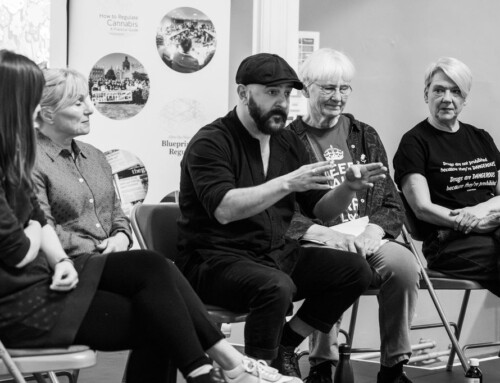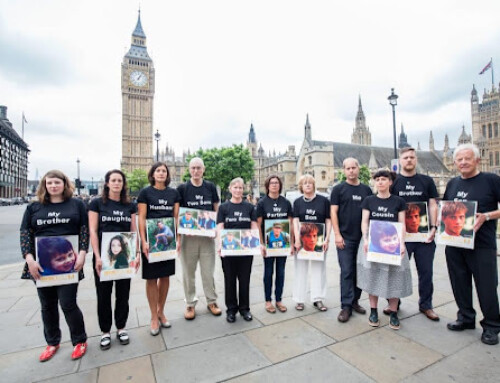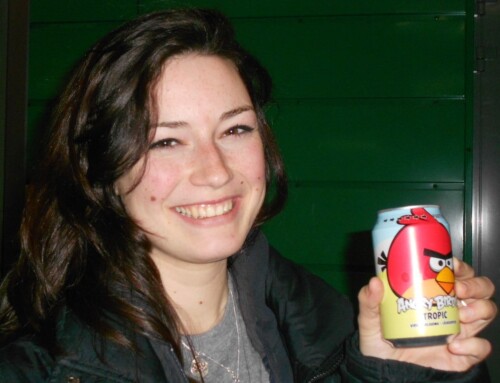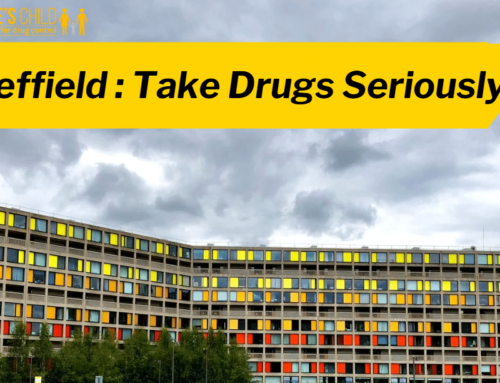This is a guest blog by Anne-Marie Cockburn
On Sunday morning I cycled to my local BBC Studio near to where I live in Oxford to take part in a BBC discussion as a result of the fact that Prince William asked the BIG question this week – should drugs be legalised?
My head felt a little hazy as I mentally prepared to tell my story and explain how I’ve come to form my views. The panel included people with opposing views to mine – Peter Hitchens, Elizabeth Burton-Phillips and David Raynes. I took a few slow deep breaths as I sat in a small room trying to gather my thoughts. I think of my precious Martha – I do all this for you my love, I whispered to myself.
An earpiece is put in my ear and I can hear voices from the studio in London and sound technicians who check with me that the sound quality is right. I’m told to look at the bright green light above a screen which shows the live footage of my own face – it’s a strange and unnatural experience. The green light is so bright I feel as though it’s burning my retina. My hair looks as though it’s made from lego, so I pin it back and look over some notes I’ve made in a small notebook.
The countdown begins and I can hear the presenters from the London studio introduce the programme. They go firstly to Peter Hitchens, who is a practiced debater. This subject evokes so much emotion and fear that many people, such as Peter, spout angry words to shut people like me down. Through my haze I hear the usual stuff from him…the war we never fought, his book, not using law enforcement the way it’s intended…, here we go again I think.
As expected, the discussion becomes heated as the panel in the studio argue their points.
What a strange life this is for me now – life without my girl, a mum of none, sat in a small studio listening to a far away voices saying things that I feel are both dangerous and misleading. The interviewer eventually comes to me and I try my best to express my views in as few words as possible. I always try to be concise and leave people with a very clear and simple impression of what it is I believe in and why I’ve drawn that conclusion. It’s always a bit of a blur and as soon as it’s over, I can never remember what I’ve actually said.
The discussion goes back to the panel in the studio and it gets heated once again, but soon time runs out and it’s all over. I often wonder whether the public are any clearer on this subject having watched a programme like this, but I hope that even if it’s just one useful piece of advice that stops them from ever knowing how it feels to be me, then these strange debates are worth it. But hand on heart, I also guess that most people may be none-the-wiser as it’s unlikely that what they’ve just heard over the 15 minutes or so the discussion lasted for, will leave them feeling empowered and informed.
All I want is to allow the truth of this important subject to reach those who need it. It would be refreshing to hear a well-rounded, fully informed discussion that would enable parents to feel empowered when broaching this subject with their own loved ones and for young people to also have easy access to good, solid information – so they could make informed choices.
All my little Martha needed was easy access to good information, but she got lost in the detail and paid the ultimate sacrifice. A tiny bit of good information could have saved her. Therefore, regardless of how painful it is to relay my story and take part in TV and radio interviews – I feel duty bound to do so. I hope that one day, the need for this will become obsolete as our laws eventually catch up with reality.
In the meantime, Peter will continue to say what he believes, and on behalf of my precious Martha, so will I.





Perhaps, now, we will all think more carefully before speaking on this subject?
Just keep going, Anne-Marie. It’ll all eventually come together.
Thank you for your efforts. I have not lost a child and don’t want to lose my grandchildren either. Please put me on your mailing list. I am also concerned for the criminalisation of a raft of the population who are just trying to alter their consciousness. My morals tell me that if I or another does not impinge on another, then its ok. my son is being harassed, imo and eviction threatened although he only smokes cannabis…this is new social policy and will cause havoc in poor families, and mine, particularly. my son has aspergers and can only socialise with this drug, which would be considered medical use anywhere sane in the world. thanks for your efforts, prohibition sets up the ideal conditions for a flourishing black market, with all the risks that brings with it.
A noble and dignified response from Ms Cockburn to Mr Hitchens.
His argument appears to be “if all the king’s horses and all the king’s men cannot put Humpty together again, all we need is more horses and more men”.